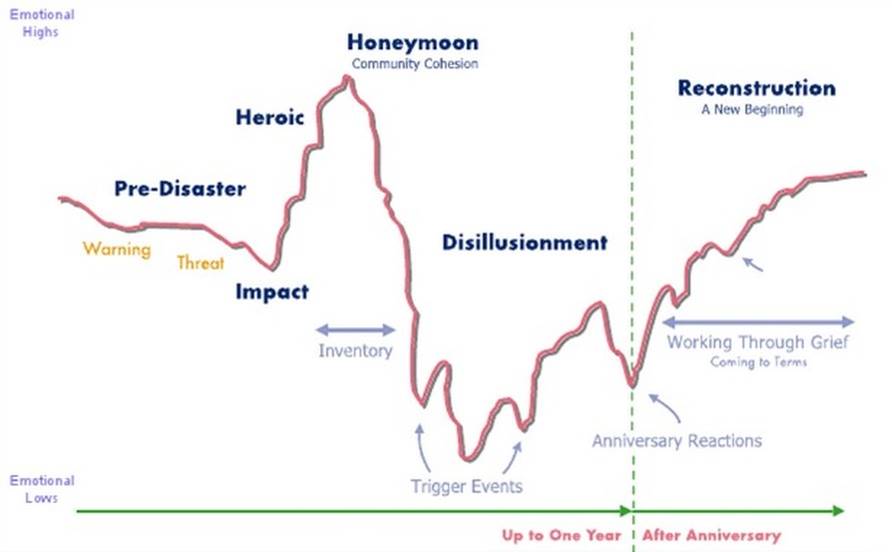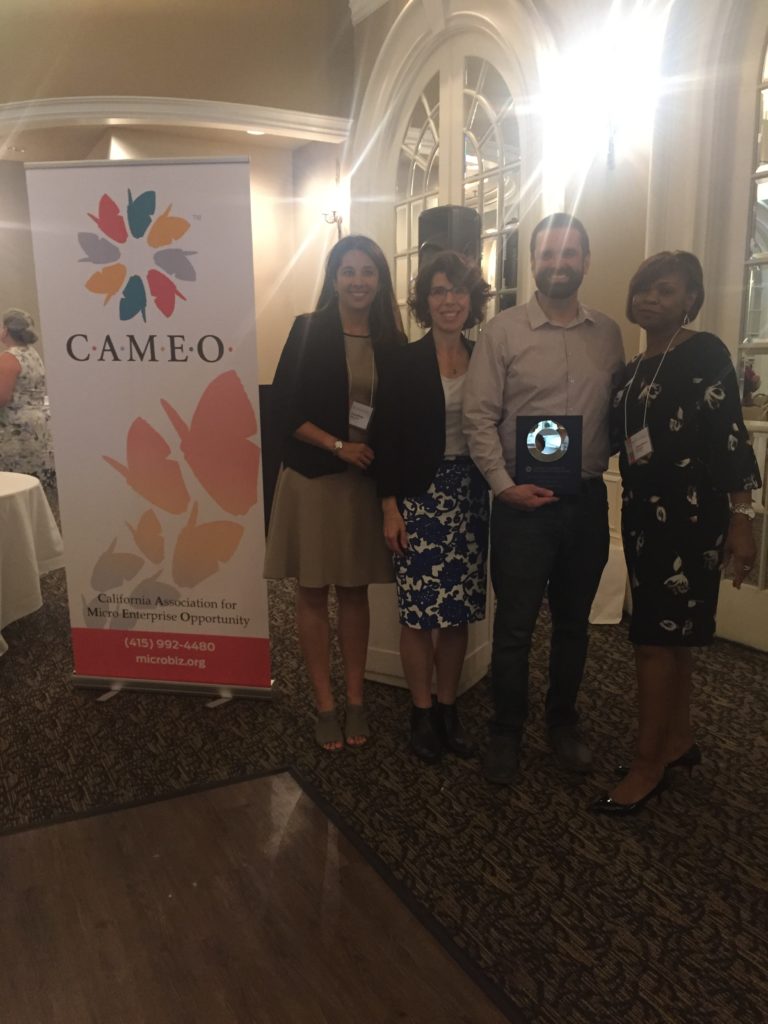With transition comes uncertainty, but also potential and opportunities. This year’s Annual Member Meeting focused on the changes and challenges our members and the wider microbusiness world have been facing for the past few years. From natural disasters to the impact of technology on the labor force, it is important to know how to adapt and remain resilient in order to function and thrive. As CAMEO’s new CEO, Carolina Martinez, takes the helm, we begin steering our organization towards the three pillars that will help us build a strong foundation: capacity building for our members, advocacy for the micro sector, and network development.
We kicked off the first day by welcoming Carolina and the new board members who will begin their duties at the start of next year. Then we hit the ground running with the first session of the day, “When Disaster Strikes.” A panel of experts and CAMEO members shared their experiences during last year’s unprecedented fires in Northern and Southern California. Businesses that do well in a disaster include those which provide necessities and those that have a diversified client base through exporting outside their communities. Businesses that do not do well are the underinsured, ones that don’t keep good records and lose employees, and those that were operating on thin margins at the time of the disaster. Here’s some advice on preparing for such a crisis:
- Have a plan to add staff capacity
- Form good relationships with your city administrator or city planner’s office
- Know who the home-based businesses are
- Manage expectations (see the graph below)

On our second session, we heard from Rani Langer-Croager of Uptima Business Bootcamp and Josh Danielson of Loconomics, two of the organizations leading the charge to better serve gig economy entrepreneurs using an innovative cooperative model that has the potential to change the current system for the better. In a cooperative model, the ‘workers’ are business owners. Both organizations urge their cooperative members to think of themselves as a business. During the session, we discussed challenges to serving this new era of self-employed, independent entrepreneurs – success metrics, marketing to them (they don’t know what they don’t know), how to build up to a living wage, and lack of training from the business-assistance organizations.
For our final morning session, we hosted a panel of representatives from the online lending space and discussed the advantages and disadvantages of these tools for microbusiness clients. As Louis Caditz-Peck of LendingClub said, “We’ve gone from helping small businesses access capital to sifting through the bombardment of offerings.” Besides talking about LendingClub’s loan products, he also talked about the Responsible Lending Coalition and the Small Business Borrower’s Bill of Rights, an effort that CAMEO strongly supports. The beauty of online lending is that it’s scalable, but it is not a replacement for CDFIs that have a ‘high-touch’ relationship with business owners. Download the morning presentations:
- Economic Impacts of Emergencies – Sonoma County Economic Development Board
- When Disaster Strikes – Women’s Economic Ventures
- Understanding Online Learning – Kabbage, LendingClub, WeFunder
After lunch, we welcomed our keynote speaker, Matt Cohen of Off-the-Grid. He told us the story of how he started in the food truck industry and how he built a network that is now a Bay Area staple. He explained how changes in the industry compelled his business to evolve from food trucks to become a company for placemaking, authentic experiences, and unlocking the value of space through food. Now he is using his know-how and connections to help other food entrepreneurs thrive in this new environment.
Then, for our afternoon breakout sessions, we learned about community collaboratives, crowdfunding, online learning, and tech tools from our member organizations – including Capbuilders, Crowdfund Better, JEDI, Small Business Majority, and Centro Community Partners. Download the afternoon presentations:
- Garnering Community Support for Microenterprise Development – Capbuilders
- Online Learning Is Here To Stay – JEDI
- Partnering with Venturize – Small Business Majority
To cap off the day we presented our annual Faces of Entrepreneurship Awards, recognizing the microbusinesses that, with the help of our members, have not only flourished but also made significant contributions to their communities. This year we honored Alicia Villanueva of Alicia’s Tamales Los Mayas in Hayward, who was nominated by the Mission Economic Development Agency; and Andrew McDowell of With Love Market & Café in Los Angeles, nominated by Crowdfund Better.

On Wednesday we had two early morning sessions, in which we discussed the Governor’s budget, the upcoming CalSavers program, and the policy landscape for small business advocacy. Download the Wednesday presentations:
(As we’ve written in the Must Know many times) the budget contains $23 million for federal small business technical assistance centers on the table (yes we’re very excited). This issue was our main talking point.
- $17 million for supplementation funding for federal small business technical assistance centers which can show they have the ability to draw down all funds identified in their federal contracts.
- $3 million for Access to Capital programs through SBDCs. This is a continuation of previous year funding.
- $3 million for counseling and workshops provided through WBCs, MBDCs, PTACs, and VBOCs.
Thanks to Assemblymembers Quirk-Silva and Cervantes who took leadership on these budget appropriations! Both the Senate and Assembly seem to be on track to approve $20 million (#1 and #2 above), which means these items will not be conference items. As the additional $3 million for WBCs, MBDCs, PTACs, and VBOCs is a new request made after the May Revise, the item will go to Conference Committee. This $3 million is intended to assist these centers to fully draw down federal funds. Stay tuned for details on how you can help, and download our advocacy talking points.
Friday, June 15 is the day that both sides of the legislature need to pass the budget.
Overall, it was a successful two-day gathering that gave us the opportunity to learn about current topics, meet new people in the industry, and set our sights on emerging challenges with refreshed perspective and purpose. As we look to our 25th anniversary next year, we reaffirm our commitment to building a solid, sustainable environment in which small and microbusinesses can grow and thrive. Big thanks to all the members from in and out of town who attended as well as our speakers, panelists, and special guests. We could not do this without you.
See you next year!
Check out more photos of the event on our Facebook page.
